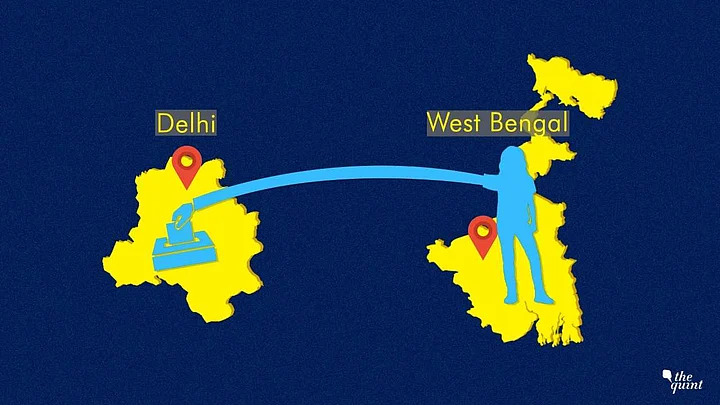I am a 27-year-old politically aware citizen of India who has never voted in her life.
Why?
‘Cause I am what you’d call an internal migrant – someone who has moved from one place to another for education, livelihood or other reason.
Like me, there are 139 million internal migrants (including those who have moved within a state and those who have moved out of a state) if you go by the 2011 census.
So what holds back internal migrants like me from exercising their voting rights?
Well, time and money.
You see, ‘Absentee Ballot /Remote voting’ is not a thing in India.
The exceptions being voters on election duty, service voters and special voters –people working for the Indian army or the Govt of India but are posted away from their constituency – and wives of the aforementioned people.
Here is a detailed list.
Since I am none of the above:
I cannot cast my vote unless I am physically present in the polling booth assigned to me as per the address written on my Voter ID/electoral roll I am registered at.
The Unofficial Poll Tax
For me to cast my vote, I have to take a leave from work for at least three days, book a flight or a train to West Bengal from New Delhi. The entire process will cost me anything north of Rs 5,000 by moderate estimates.
While this figure may vary for the rest of the 43.37 cr people in India who identify as an internal migrant, why should there be any sort of poll tax to exercise my right as a citizen?
It turns out that apart from the above mentioned list, there is another group that is allowed to vote remotely – the NRIs. Yes, as of 2017, the Non-Resident Indians can cast their vote in Indian elections remotely through a method of proxy voting.
Setting up remote polling stations, Internet voting, and postal ballots were also considered but rejected due to security, privacy and logistical reasons.
So why was the proxy voting never considered for the 139 million internal migrants in the country?
I reached out to Vinod Zutshi, former deputy election commissioner, to understand this better. This is what he had to say:
“The committee that I chaired only dwelled on options for overseas electors to be able to cast their vote more transparently. We did discuss this informally in passing when assessing Internet voting as an option for NRIs. From the perspective of a level playing field, even internal migrants would want to be able to vote when they are travelling away on the voting day. But otherwise, there was no structured discussion on the matter. Mostly because it is very difficult to account for voters who maybe traveling on election day. For those who have moved to a different constituency, the system allows them to register themselves on a different electoral roll via Form 6.”Vinod Zutshi, former deputy election commissioner and the chairperson of the Committee for Exploring Feasibility Of Alternative Options for Voting By Overseas Electors
Rules For Voting From Different State
I could enlist my name in a new voter’s list that simply? This was news to me.
“Every time you move, you have to request the Electoral Registration Officer of the constituency you have moved to, to enroll your name in the voter list of that particular constituency, and delete your name from the voter list of your previous constituency,” Zutshi further clarified.
Point to note here is that once you get your name enrolled in a new voter list, and take your name off the previous list, you wont be allowed to take part in any local elections from your previous constituency.
But this method can be repeated as many times as one moves out of their polling station area, as long as a valid address proof of the new location is provided. Valid address proof may include any government ID like passport, Aadhaar, etc, bank passbook, or even utility bill such as electricity bill or gas connection under one's own name. Duly registered rental documents are also considered as address proof when enrolling to a fresh voter list.
Here’s a full list of documents accepted as address proof.
- Indian Passport
- Driving License
- Bank or Post Office Pass Book
- Ration Card
- Income Tax Assessment Order
- Rent Agreement
- Water Bill
- Phone Bill
- Electricity Bill
- Gas Connection Bill
What’s more, registering oneself in a new constituency by informing the election register officer is encouraged by the ECI. If not, one may even lose all voting rights whatsoever!
While doing house to house survey, if it is found that a person on the voter list does not reside in the address mentioned in their records, their name may also be taken off from the list after sending them notice.
But was this method really as simple as the former deputy election commissioner makes it to be? To find out, I logged in to the ECI website and applied, and…
...failed.
The website simply couldn’t upload the documents I had submitted as my identity, age and address proof (a passport size photo, my Aadhaar card, and my gas bill).
In the age when even political campaigns are happening over WhatsApp groups, I wasn’t able to submit a simple online form seamlessly.
The last resort was to download the form, fill it manually and physically present it to the election register officer of my area, which was cumbersome to say the least, but the only choice. I did so on 12 November.
As I wait for the authorities to tell me if my name made it to the list, tell us in comments if you will go through the ‘due process’ to enlist your name on a new voter’s list, or prefer an easier way out to cast your vote.
(This story was originally published 19 November 2018, and has been republished for General Elections 2019.)
